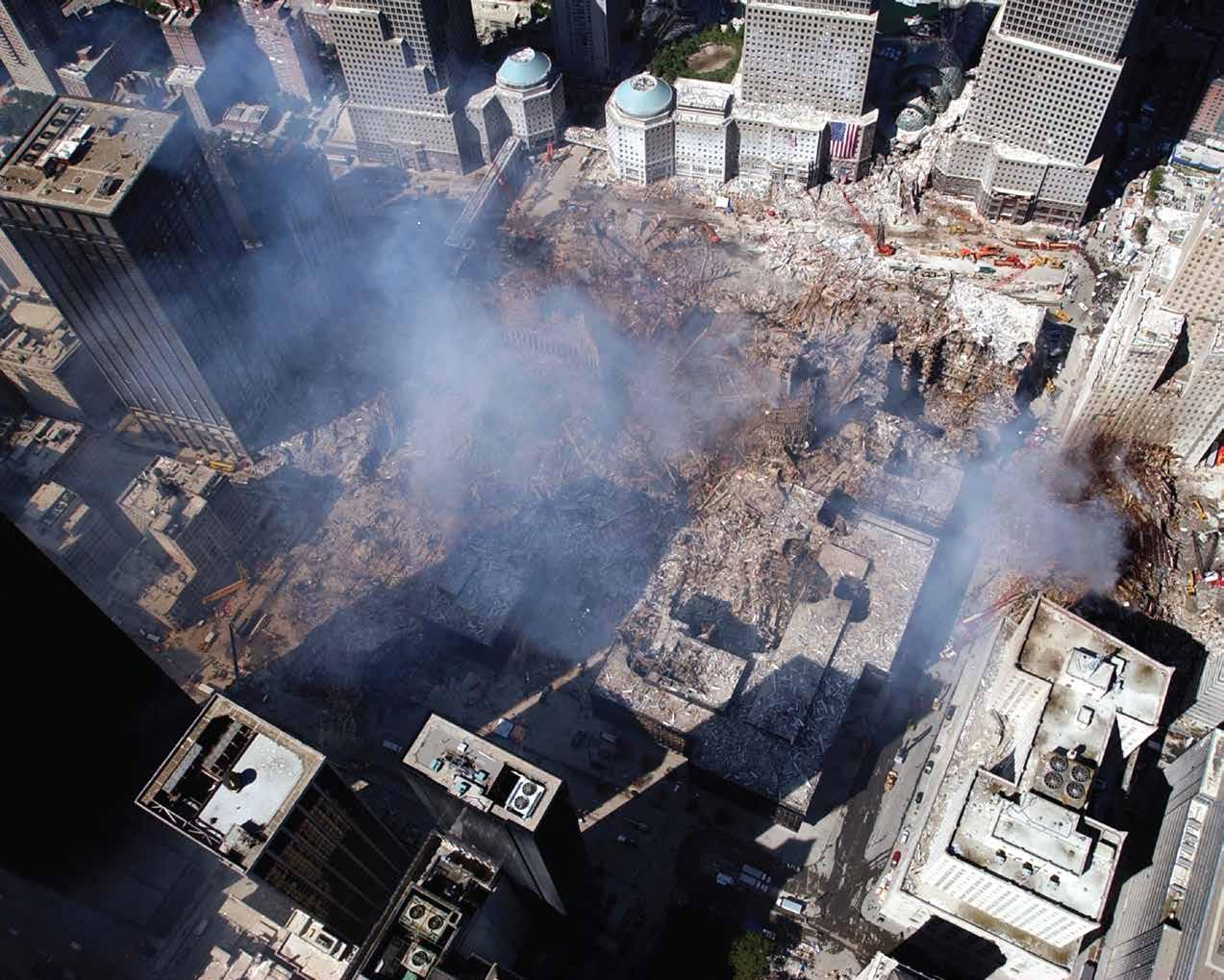
10 minute read
More weapons, but less peace The Paradox of our Time
by Hadje C. Sadje, Belgium
Ground Zero, New York City, N.Y. (Sept. 17, 2001) -- An aerial view shows only a small portion of the scene where the World Trade Centre collapsed following the Sept. 11 terrorist attack. Surrounding buildings were heavily damaged by the debris and massive force of the falling twin towers. Clean-up efforts are expected to continue for months. Photo by U.S. Navy Chief Photographer's Mate Eric J. Tilford.
Aside from the emergence of several highly militarised societies, “why do we have more weapons, but have less and less peace today?” After the 9/11 attacks, fear grows (Resnik 2017). When American and its allies withdrew from the Iran nuclear deal, it gives the people the impression that a new war is coming soon. While Western mainstream media exaggerate the “Iran-phobia” and “Russophobia”, the American and its allies creating an atmosphere to normalise war of aggression on the world stage. Actually, scholars have seen that these are the days of normalising international crimes of aggression (Lange 2016). The Rome Statute of the International Criminal Court articles 8 bis 1 and 2 state: “The crime of aggression means "the planning, preparation, initiation or execution, by a person in a position effectively to exercise control over or to direct the political or military action of a State, of an act of aggression which, by its character, gravity and scale, constitutes a manifest violation of the Charter of the United Nations". Despite being repeatedly asserted by various organisations of civil society, the noncompliance with these norms was widespread. The ideology of no alternatives for a war was pursued. War, specifically, preemptive war, has become standard, usual, or expected. This set of ideology or ideology of no alternative for war was manufactured and maintained by Western policymakers and the Western mainstream media. Miserably, war (over arbitration, the World Court, conciliation, and conference) became a permanent condition for global peace. Ironically, many people believe and embrace that there is no alternative but to accept war. Even without an asserting legitimate right of self-defense. As Rosa Brooks (2016) argues, “...everything became war, and the military became everything”.

The normalisation of war, nonetheless, is not striking new. As a matter of fact, the classical view of modern state formation relied on the monopoly of violence, military conquest, oppression, and occupation to constitute nation-building, especially based on the historical experiences of European states (Tilly 1985; Hobbes 1997; Joireman 2004; Taylor 2008). And it has had a long and depressing history (Axtmann 2004). But nowadays, many scholars are opposed to war. They believe war is not the best option to solve international disputes, not because it is the most politically effective or advantageous position (Joireman 2004). Rather, war is a false choice and an indication of a weak state.
Lamentably, the twentieth history has, once again, seen a reversal of desire with war culture. It is increasingly becoming normalised in everyday media and social platforms (Farhat 2015). Alongside the normalisation of war, the obsession of some Western and non-Western nations with military culture continues. The militarisation of civil society have become a new normal (DeFrieze 2014; Evans 2017). For instance, according to Global Militarisation Index-Bonn International Center for Conversion (2016), “...ten countries that have the highest levels of militarisation for the year 2015 are Israel, Singapore, Armenia, Jordan, Russia, South Korea, Cyprus, Greece, Azerbaijan and Brunei.” GMI added, “These countries allocate particularly high levels of resources to the armed forces in comparison to other areas of society (2016)”.
In connection, the normalisation of war-military culture and arms proliferation goes hand in hand. The report shows that the volume of international arms transfers has grown steadily since 2003, especially small arms, light weapons, illicit arms, and weapons of mass destruction (GRIP 2017; Amnesty International 2019; EU-EA 2019; ). According to Amnesty International (2019): despite the arms trade treaty, the global spending on arms is booming. AI also stated that “...SIPRI estimates that the total value of the global arms trade in 2017 was at least $95 billion.” And, the “United States accounted for 36 percent of world military spending in 2018”. While the “Saudi Arabia became the world’s largest arms importer and the US and UK are by far the largest suppliers (Amnesty International August 23, 2019)”.
How about the human face of war? It should not be forgotten that the human costs of war are certainly profound and devastating---direct and indirect victims. For instance, according to estimates of Control Arms, “...8 million light weapons are produced each year. 2 bullets are produced each year for every person on the planet. 2 out of 3 people killed by armed violence die in countries "at peace". 10 people are injured for every person killed by armed violence” (Compass 2012). A similar observation was made in a recent report of the Uppsala Conflict Data Program (2019), accordingly, “2,436,351 people have died in armed conflicts since 1989 – with over 77,320 in 2018”.
Of course, this is only a conservative estimate and the people have died is increasing, including an unknown number of civilians. Similarly, in 2001, the Watson Institute of International and Public Affairs (2001) write a perfect summary of the costs of war: (a) over 480,000 have died due to direct war violence, and several times as many indirectly (b) over 244,000 civilians have been killed as a result of the fighting (c) 21 million — the number of war refugees and displaced persons (d) The US federal price tag for the post-9/11 wars is over $5.9 trillion dollars (e) The US government is conducting counter-terror activities in 80 countries (f) The wars have been accompanied by violations of human rights and civil liberties, in the US and abroad. In addition, WIIPA (2001) also showed that more than 400 million metric tons are directly contributed to climate change due to war-related fuel consumption, specifically United States military operations.
Evidently, these brutal realities of war-military culture raise political-economic and moral-theological challenges. But, the Christian churches have adopted different positions on war-military culture. There are many theologies that justified violence and support war-military operations (Gentile 1990; Graham 2017). Of course, it is notoriously dangerous to make generalisations. Nevertheless, in every part of the Christian community and every theological tradition there seem to be some common trends.
Despite such diversities, a general revival of interest in the great theological disciplines: systematics, church history, ethics, and, perhaps above all, the Scripture to justify violence and support war-military operations. On May 14, 1948, for instance, the declaration of the establishment of the modern State of Israel was supported and justified by the theology of the Christian Zionists (Burge 2003; Sizer 2004; Masalha 2007). With the use of violence and methods of ethnic cleansing, the Zionist movement successfully take up some 78 percent of historic Palestine (Pappé 2006). Up to now, Israel’s colonisation, human rights violations of Palestinian rights, and the militarisation of the Palestinian society continue. It is getting worse day by day (Amnesty International 2019; HRW World Report 2019; OHCHR 2019). Sadly, it is politically, culturally, financially, militarily, and theologically supported by global Zionist Jews and the American Christian “fundamentalists” (Chomsky 2010; Finkelstein 2016). Another example is the American invasion and occupation of Iraq in September 2001. The American global campaign “war on terror” becomes “holy crusade” against Muslim nations (Aljazeera 2006; Haberski, Jr. 2009). During the American campaign to remove the Saddam regime, a professor of religion Charles Marsh observed, the American evangelicals had a shaky theological basis to support the Iraq War. In his article entitled “Wayward Christian Soldiers“ which was originally published in The New York Times (2006), Marsh writes:

“The war sermons rallied the evangelical congregations behind the invasion of Iraq. An astonishing 87 percent of all white evangelical Christians in the United States supported the president's decision in April 2003. Recent polls indicate that 68 percent of white evangelicals continue to support the war. But what surprised me, looking at these sermons nearly three years later, was how little attention they paid to actual Christian moral doctrine. Some tried to square the American invasion with Christian "just war" theory, but such efforts could never quite reckon with the criterion that force must only be used as a last resort. As a result, many ministers dismissed the theory as no longer relevant.”
Marsh continued:
“Some preachers tried to link Saddam Hussein with wicked King Nebuchadnezzar of Biblical fame, but these arguments depended on esoteric interpretations of the Old Testament book of II Kings and could not easily be reduced to the kinds of catchy phrases that are projected onto video screens in vast evangelical churches. The single common theme among the war sermons appeared to be this: our president [George WH Bush Jr.] is a real brother in Christ, and because he has discerned that God's will is for our nation to be at war against Iraq, we shall gloriously comply.”
Obviously, this is the situation that is cloaked by the theology of American exceptionalism provided by the ideology of the dominant class (Haberski, Jr. 2009). It is useful to the American government and the American Christian fundamentalists, to justify to their ideological “preordained quasi-messianic mission”---the messianic sense of the nation’s destiny (McDougall 1988). It would, however, be totally consistent with the Christian faith and the theology of the Church if America would show a very strong commitment to support just-peace and totally reject the war-military culture. Even in non-Western nations, there are some theologies supported the state violence. For example, the Philippine President Rodrigo Roa Duterte’s bloody war on drugs campaign is actively supported by many Filipino Evangelical and Pentecostal churches (Ravillas 2018; Cornelio and Medina 2019). In fact, it is publicly continued to express by various Christian groups (Cornelio and Medina 2019).
King Nebuchadnezzar Besieging Jerusalem by Frans Pourbus the Elder


There are two ways, by the theologians and the people of God, to counteract the normalisation of war-military culture and arms proliferation, whether a theologian, a minister, and a student, every voice counts. In the same way, everyone has a unique reach and can create a ripple effect across our spheres of influence. But, first and foremost, “be informed” or “educate yourself”. The global Christian churches should seek alternatives. There are other theological views. In contrast with theology above, some theologies opposed state violence, participation in the war, and reject military culture (Hauerwas 1983; Kaufmann 1989; Canadian Conference of Mennonite Brethren Churches 2014). Most of these theologies are not popular and not appreciated, often misunderstood by other Christian communities. Yet, the challenge has been undertaken. For instance, the Mennonite Church has long been associated with peace theology and conscious objection to war and military operation. Their publications contributed to the entire range of theological research on just-peace issues. Using the Mennonite peace theology, it might be worthwhile rediscovering and reevaluating our theological propositions as one of the alternatives. For example, Mennonite Position on Military Service (Mennonite Church 1917), Mennonite Peace Theology: A Panoramic Types (1991), The Politics of Jesus by John Howard Yoder (1968), Living Gently in a Violent World by Stanley Hauerwas (2008), If Jesus is Lord: Loving Our Enemies in Age of Violence by Ronald Sider (2019). The theology of non-violence articulated as part of a broader work: The Anabaptist Vision by Harold S Bender (1944), The Upside Down Kingdom by Donald Kraybill (1978), The Naked Anabaptist by Stuart Murray (2010) to name a few. It is not that easy but it is worth.
Next, “the public opinion shapes public policy, therefore theology should influence the public opinion” While on the ground, state violence and the militarisation of civil society has become commonplace, the global Christian community should develop a theology that can penetrate the moral crisis of military discourse, especially on war culture and arms proliferation (Brueggemann 2001; Oliver 2004; Lindsay-Poland 2017; Koehler 2018). Scholars argue that war is a large scale social behavior and carried out by a polity. Therefore, the Christian churches should actively participate in the formation of public opinion and subsequently affect policy (Joas and Knöbl 2012). But, the involvement of Christian churches in the formation of public opinion does not exclude other faith traditions and non-believers. Through the formation of public opinion, political action is made possible that will provide the condition, including condemning the illicit arms proliferation and the normalisation the war-military culture. The global Christianity need a small step beyond the parameters of conventional beliefs that rejects the conventional left-right or pro-anti-war spectrum. They should take their faith tradition into public arena with intellectual humility, willingness to be proven wrong, espouse tolerance of diversity and reject discrimination.

In conclusion, let us get back to the main question, “why we have more weapons, but we have less and less peace today?” The facts speak for themselves that the global superpowers lulled the global community into a false sense of peace and order---Pax Americana. It can be certain, however, the normalisation of war-military culture and arms proliferation (small, light, and illicit weapons) caused immense destruction across the globe. The money, time, and political capital invested in pursuing the “War on Terror”, rather than investing in fighting global warming, massive poverty, AIDS, lack of education, unemployment, malnourishment, and hunger (UN Global Issues). Simply put, the global actors focusing on the wrong front. If people think that there is no viable alternative, then accept the militarism and propensity of war, think again. Or, if people think, it’s not a problem that’s the problem! As Jesus says in Matthew 26: 52, “Live by the Sword - Die by the Sword”.
An invitation to pray and ponder offered by the Canadian Conference of Mennonite Brethren Churches document entitled, “Christian and War” (1993):
Pray for peace and for people in government.
Make every effort to obey the law; however, do not accept military service that involves training in how to kill fellow human beings who are also made in the image of God.
Join a relief organisation to serve unarmed in war zones; provide aid to the victims of war.
Do not avoid dangerous assignments while doing good; Christians are not cowards.
Even in honourable professions and businesses, do not exploit the tragedy of war for personal gain.
Make a living by producing goods and services that sustain life; refuse jobs associated with killing and destruction.
Be willing to accept the penalties the state may impose for those who refuse to participate in military action.
Witness to the conviction that Christians who believe Jesus taught his followers not to kill cannot serve as soldiers but willingly serve their country in constructive ways.
Urge the peaceful resolution of all disputes while recognising that leaders of countries are part of this world’s system and do not, therefore, rule in full accord with the biblical principle of peace.
Share the good news of salvation even in time of war.






